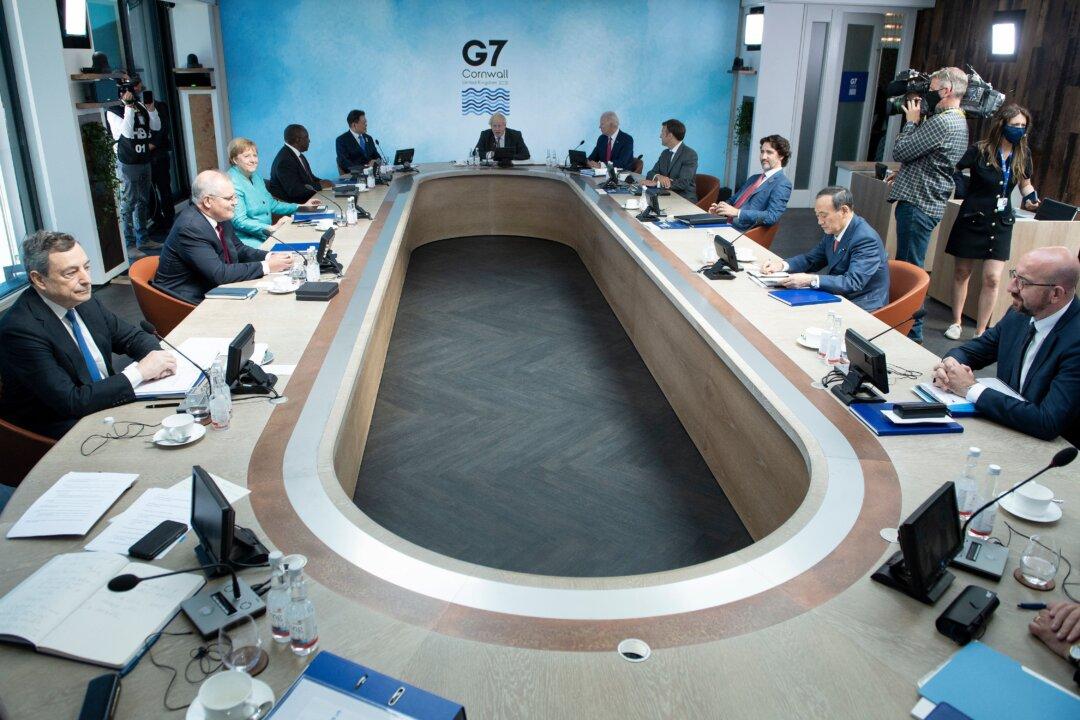Group of Seven (G-7) leaders called out the Chinese regime on June 13 over its human rights abuses in Xinjiang and Hong Kong, vowed to counter Beijing’s unfair trade practices, and demanded a thorough investigation into the origins of the COVID-19 pandemic in China.
After discussing how to come up with a unified position on China, leaders of the world’s wealthiest democracies issued a highly critical communiqué that delved into a range of concerns targeting the communist regime’s behavior domestically and abroad.
“We will promote our values, including by calling on China to respect human rights and fundamental freedoms, especially in relation to Xinjiang and those rights, freedoms, and high degree of autonomy for Hong Kong enshrined in the Sino-British Joint Declaration,” the G-7 said.
Global pushback against Beijing’s aggression has risen recently, and President Joe Biden has pledged to rally allies to confront the regime’s economic abuses and push back against human rights violations.
Speaking after the summit in England, Biden said leaders agreed to a proposal to finance infrastructure projects in the developing world that would counter Beijing’s “Belt and Road” Initiative. The Belt and Road project has been criticized as a form of “debt trap” diplomacy that saddles developing nations with unsustainable debt levels, while bolstering Beijing’s political and economic clout in those countries.
“We think there is a more equitable way to provide for the needs of countries around the world,” Biden said.
The president also called on the regime to abide by global rules.
“China needs to start to act more responsibly in terms of international norms and human rights and transparency,” Biden said.
He demanded Beijing provide access to its labs so the world can probe the origins of the COVID-19 pandemic, including the possibility that it was the result of “an experiment gone awry.”
“The world needs to have access,” Biden said.
The G-7 called for “a timely, transparent, expert-led, and science-based WHO-convened Phase 2 COVID-19 Origins study including, as recommended by the experts’ report, in China.”
Before the criticism emerged, China pointedly cautioned G-7 leaders that the days when “small” groups of countries decided the fate of the world were long gone.
The G-7 also said they underscored “the importance of peace and stability across the Taiwan Strait, and encourage the peaceful resolution of cross-strait issues.”
“We remain seriously concerned about the situation in the East and South China Seas and strongly oppose any unilateral attempts to change the status quo and increase tensions,” they said.
The communiqué further highlighted concern about forced labor in global supply chains, including in the agricultural, solar, and garment sectors. These industries are the “main supply chains of concern” in the far western Chinese region of Xinjiang, a White House fact sheet noted.
The Chinese regime has detained more than 1 million Uyghurs and other Muslim minorities in a vast network of camps in the region. Inhabitants and detainees have been subject to torture, political indoctrination, forced sterilization, forced labor, and mass surveillance under Beijing’s sweeping crackdown.
Many Western fashion brands, tech companies, and other international businesses have come under growing pressure to prove their supply chains aren’t tainted by forced labor from Xinjiang.
“Leaders agreed on the importance of upholding human rights and of international labor standards, and committed to protect individuals from forced labor,” the White House said in a fact sheet.





